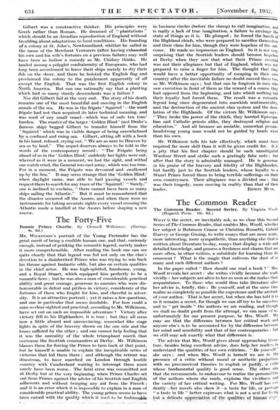The Forty-Five
Ma. WILKINSON'S portrait of the Young Pretender has the great merit of being a credible human one, and that, curiously enough, instead of pricking the romantic legend, merely makes it more comprehensible. After reading the book one can see quite clearly that that legend was fed not only on the clan's devotion to a disinherited Prince who was trying to win back his throne against fantastic odds, but also on certain qualities in the chief actor. He was high-spirited, handsome, young, and a Royal Stuart, which equipped him perfectly to be a romantic hero ; but he was also a man of considerable practical ability and great courage, generous to enemies who were dis- honourable in defeat and pitiless in victory, considerate of the fortunes of those who fought for him, and cheerful in adver- sity. It is an attractive portrait ; yet it raises a few questions, and one in particular that seems insoluble. For how could a man so clear-sighted and practical, according to Mr. Wilkinson, have set out on such an impossible adventure ? Victory after victory fell to his Highlanders, it is true ; but they all seem now a little absurd and unconvincing, somewhat like stage fights in spite of the bravery shown on the one side and the losses suffered by the other ; and one cannot help feeling that it was the unreality of the whole triumphant march that overcame the Scottish commanders at Derby. Mr. Wilkinson blames them for forcing the Prince to turn back at that point, but he himself is unable to explain the inexplicable series of victories that led them there ; and although the retreat was disastrous, to have marched on London through hostile country with Cumberland waiting to intercept them must surely have been worse. The fatal error was committed not at Derby but at the very beginning, when Prince Charles set out from France against the advice of his Scottish and English adherents and without bringing any aid from the French ; and it is an error which it is impossible to explain in is man of considerable practical ability. The young prince seems to have been cursed with the quality which it used to loe fashionable s in business circles (before the slump) to call imagination, and is really a _lack of true imagination, a failure to envisage the' state of things as it is. He plunged ; he forced the hands o(. the Highland chiefs, who were prepared to sacrifice themselves and their clans for him, though they were hopeless of the out. come. He made no impression on England. So it is not vet), surprising that the Scottish leaders should become hopeless-- at Derby when they saw that what their Prince coveted: was not their allegiance but that of England, which was not prepared to raise a finger for him. The thought that they would have a better opportunity of escaping in their own country after the inevitable failure no doubt moved them toe, as Mr. Wilkinson says ; but that can be forgiven in men who saw execution in front of them as the reward of a course they had opposed from the beginning, and into which nothing but their loyalty had forced them. The result was a romantic legend long since degenerated into mawkish sentimentality, and the destruction of the ancient clan system and the deso- lation of the Highlands. Of the victors Mr. Wilkinson says : "They broke the power of the chiefs, they harried Episcopa- lian and Catholic priests alike, they destroyed religion and education." And all because an amiable, somewhat prosaic, headstrong young man would not be guided by heads wiser than his own.
Mr. Wilkinson tells his tale effectively, which must have required far more skill than it will be given credit for. It is a pity that his first chapter should be such unmitigated Wardour Street and strike such a gratingly false note ; but after that the story is admirably managed. He is generous in his praise of the bravery and fidelity of the Highlanders, but hardly just to the Scottish leaders, whose loyalty to a Stuart Prince forced them to bring terrible sufferings on their own countrymen. Their allegiance was a divided one ; that was their tragedy, more moving in reality than that of their










































 Previous page
Previous page